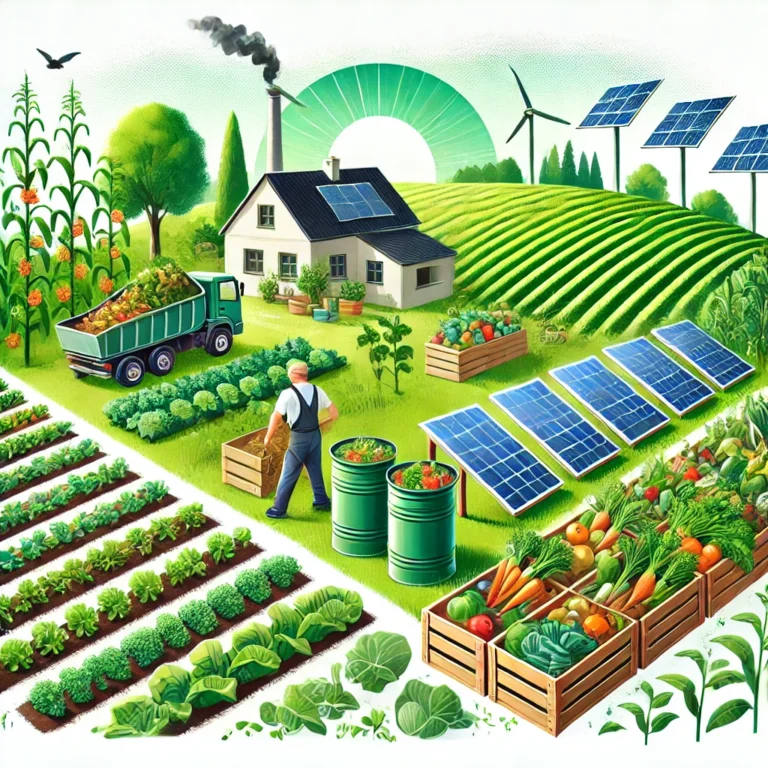How Organic Farming is Saving the Planet: A Deep Dive into Sustainable Agriculture
In an era where environmental issues are at the forefront of global discussions, organic farming has emerged as a powerful solution to promote sustainability and reduce our carbon footprint. Unlike conventional farming, which often relies on synthetic chemicals and intensive farming practices, organic farming focuses on natural methods that work in harmony with the environment. In this blog, we explore how organic farming is saving the planet and why it plays a crucial role in promoting sustainable agriculture.

1. Reduces Soil Erosion and Degradation
One of the most significant benefits of organic farming is its ability to reduce soil erosion and degradation. By using organic fertilizers like compost and manure, organic farmers enhance soil structure, making it more resilient to erosion caused by wind and water. Organic farming practices such as crop rotation, cover cropping, and reduced tillage help maintain healthy soil, which is essential for sustainable agriculture and the long-term productivity of our farmlands.
2. Promotes Biodiversity
Organic farms are often rich in biodiversity, providing habitats for various plant and animal species. Unlike conventional farms that rely heavily on monoculture, organic farms grow a variety of crops and use natural pest control methods, which create a balanced ecosystem. This biodiversity is crucial for pollination, natural pest control, and maintaining a healthy environment. By supporting organic farming, we are preserving habitats and promoting a diverse ecosystem that benefits wildlife and agriculture alike.
3. Reduces Chemical Pollution
Conventional farming practices often involve the use of synthetic pesticides, herbicides, and fertilizers, which can lead to chemical runoff into nearby water bodies, causing pollution and harming aquatic life. Organic farming eliminates the use of these harmful chemicals, reducing the risk of water contamination. By using natural alternatives like organic compost and biological pest control, organic farming keeps our water sources clean and safe for both humans and wildlife.
4. Lowers Greenhouse Gas Emissions
Organic farming contributes to the reduction of greenhouse gas emissions by avoiding the use of synthetic fertilizers, which are major sources of nitrous oxide, a potent greenhouse gas. Additionally, organic farming practices such as crop rotation and the use of cover crops help sequester carbon in the soil, reducing the amount of carbon dioxide in the atmosphere. This carbon sequestration is a natural way to combat climate change and mitigate its impacts.
5. Conserves Water
Water conservation is another key benefit of organic farming. Organic farms typically have better soil structure and higher organic matter content, which improves water retention and reduces the need for irrigation. This efficient use of water is particularly important in areas prone to drought and water scarcity. By conserving water, organic farming contributes to the sustainable use of our planet’s limited water resources.
6. Supports Animal Welfare
Organic farming practices extend beyond crops to include the ethical treatment of animals. Organic livestock farming ensures that animals are raised in natural, humane conditions without the use of antibiotics or growth hormones. Animals are given access to outdoor spaces and organic feed, which promotes their well-being and health. Supporting organic animal farming aligns with ethical values and ensures the humane treatment of farm animals.
7. Reduces Dependence on Fossil Fuels
Conventional agriculture relies heavily on fossil fuels for the production and transportation of synthetic fertilizers and pesticides. In contrast, organic farming reduces this dependence by using natural, locally sourced inputs. This not only reduces the carbon footprint of agriculture but also promotes energy conservation and sustainability.
8. Encourages Sustainable Practices
Organic farming encourages sustainable agricultural practices that are beneficial for both the environment and future generations. By prioritizing soil health, water conservation, and biodiversity, organic farming creates a sustainable agricultural system that can continue to provide food and resources without depleting the earth’s natural resources.
9. Improves Public Health
Reducing the use of harmful chemicals in farming not only benefits the environment but also improves public health. Organic farming eliminates exposure to toxic pesticides and fertilizers, leading to healthier food options for consumers. By choosing organic products, we can reduce our exposure to chemical residues and promote better health for ourselves and our families.
10. Fosters Community and Economic Growth
Organic farming supports local economies and fosters a sense of community. Organic farms often sell their products locally, reducing transportation emissions and supporting local farmers. This not only benefits the environment but also strengthens local economies and promotes sustainable development within communities.
Organic farming is more than just a trend; it’s a powerful movement towards a sustainable and environmentally-friendly future. By reducing soil erosion, promoting biodiversity, lowering greenhouse gas emissions, conserving water, and supporting ethical farming practices, organic farming is playing a vital role in saving our planet. As consumers, we can support this movement by choosing organic products and advocating for sustainable agricultural practices. Together, we can make a positive impact on our environment and ensure a healthier planet for generations to come.
